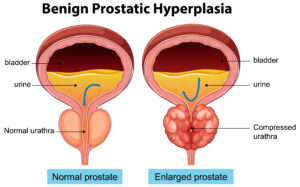Transurethral Resection of the Prostate in Georgia
Benign prostatic hyperplasia (BPH) or enlarged prostate is a common ailment that afflicts millions of men (especially those over 50 years old). At Central GA Urology, we are proud to provide advanced treatment options including the Transurethral Resection of the Prostate in Georgia or TURP, which is considered one of the most trusted procedures to relieve urinary symptoms associated with prostate enlargement.
This blog will explain what TURP surgery for enlarged prostate involves, who is a good candidate, what recovery looks like, and the key benefits and risks of TURP surgery.
What Is Transurethral Resection of the Prostate (TURP)?
Transurethral Resection of the Prostate in Georgia is a procedure which is carried out with surgery that treats urinary Diseases associated with an prostate enlargement. In this procedure, a surgeon inserts a resectoscope through the urethra and removes excess prostate tissue and allows for a stronger, more consistent urine flow.
Unlike open surgery, TURP is done through the urethra and no external incision is made. For many men in Georgia looking for long-term relief, minimally invasive TURP procedure is a preferred option.
TURP Surgery for Enlarged Prostate – Why It’s Needed
Many men will use medications as a first course of action in managing BPH, however, when symptoms get worse or there are complications involved, surgery may be suggested. Common symptoms that may lead to TURP surgery for enlarged prostate include:
- Urinary frequency, especially nocturnal urinary frequency
- A weak urine flow or trouble starting urination
- Incomplete emptying of the bladder
- Recurrent Urinary Tract Infections
- Bladder stones or Urinary retention
For patients struggling with these issues, the Transurethral Resection of the Prostate in Georgia provides lasting relief and a better quality of life.
Minimally Invasive TURP Procedure in Georgia
At Central GA Urology, patient safety and comfort are our primary concern and we offer the minimally invasive TURP procedure in Georgia. The procedure lasts for about 60-90 minutes and is done while the individual is under anesthesia.
Because the prostate tissue is removed by a resectoscope, there are no large incisions. Most patients are admitted overnight and go home the following day with a catheter that is typically taken out in 24-48 hours.
This minimally invasive TURP procedure in Georgia guarantees patients recover quicker than older more invasive surgical techniques.
TURP Prostate Surgery Recovery – What to Expect
Recovery is a major issue for those patients who consider surgery.
- Hospitalization: Usually only day or overnight observation.
- Activity Level: Light activity should be suggested for 2-3 weeks; heavy exercise is contraindicated.
- Improved Symptoms: Most men experience improved urine stream within days, which continues to improve over a few weeks.
- Return to Work: The majority of patients can resume regular activities in week 1-2.
Our team at Central GA Urology provides detailed guidance to ensure smooth TURP prostate surgery recovery and ongoing support after the procedure.
Benefits and Risks of TURP Surgery
Like all medical procedures, it’s important to weigh the benefits and risks of TURP surgery before making a decision.
Benefits of TURP:
- Sustained BPH symptoms relief
- improvement in urine flow and in emptying
- Less chance of bladder injury or urinary retention
- Decades of experience with proven results.
- Improved quality of life and regained confidence.
Risks of TURP:
- Temporary trouble urinating after surgery
- Risk of UTI or bleeding
- Occasional complications include can include the following:
- In rare cases, need to be re-treated in the future
At Central GA Urology, we carefully explain the benefits and risks of TURP surgery so patients can make an informed decision with confidence.
TURP vs. GreenLight Laser Prostatectomy – Which Is Right for You?
Some patients wonder whether they should go with Transurethral Resection of the Prostate in Georgia or GreenLight laser. Both are effective, less invasive therapies for BPH. in Georgia
- TURP is the “gold Stand” with a long history of proven results.
- GreenLight laser causes less bleeding and is therefore safe for men who are taking blood thinners
Both procedures offer excellent symptom relief, with the best choice determined by each person’s health needs.
At Central GA Urology, we provide both options and will suggest the most appropriate treatment after a careful evaluation
Why Choose Central GA Urology for TURP Surgery?
When it comes to your prostate health, experience and technology count. At Central GA Urology we have performed thousands of minimally invasive TURP procedures in Georgia with success which have restored normal urinary function in men and changed their lives.
Our compassionate team guides patients through every step–from consultation to surgery to TURP prostate surgery recovery–with expert care and support.
Take the First Step Toward Relief
If you are feeling symptoms of an enlarged prostate, don’t let them get worse. The Transurethral Resection of the Prostate in Georgia is a tried and tested procedure that provides long-term relief, safe outcomes and a better quality of life.
Schedule your consultation with Central GA Urology today to learn whether TURP surgery for enlarged prostate is the right option for you.
Conclusion
Transurethral Resection of Prostate Georgia is still one of the most successful treatments for BPH. With the minimally invasive TURP procedure in Georgia, patients have quicker recovery times, fewer complications, and long-term elimination of urinary issues.
Whether you are considering surgery for the first time or you are seeking expert opinion after medical therapy has failed, Central GA Urology is here to offer safe, effective and caring care.
Take control of your prostate health–discover the relief of TURP prostate surgery recovery and the proven results of this time-tested treatment.


